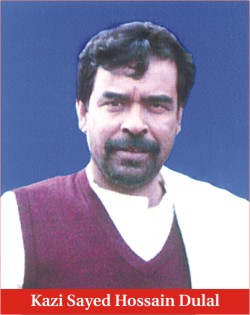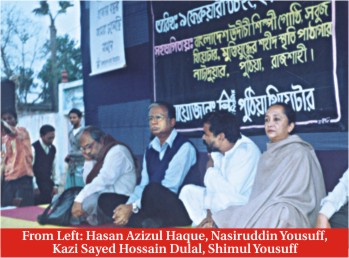| Journey Through Bangladesh
From Rajshashi
Puthia Theatre: Heritage and Posterity
Saba El Kabir
 THE Puthia region of Rajhshahi has been fertile grounds for the performing folk art forms of Bangladesh. The communities of the region are not only proud patrons of age-old artistic traditions, they are also the hosts of a variety of living art forms. The list of art forms still practiced in Puthia is staggering. It includes, but is not limited to: Alkap, Jhumurjatra, Nachimoner Pala, Madar Basher Jari, Madarer Jari, Michilgan, Jugirgaan, Akdel Jaatra, Noukabilash, Monshamongol, Gorokkhonath, Mati Khocha, Shiber Gajon (Aushtagaan) and Laathi Khela. THE Puthia region of Rajhshahi has been fertile grounds for the performing folk art forms of Bangladesh. The communities of the region are not only proud patrons of age-old artistic traditions, they are also the hosts of a variety of living art forms. The list of art forms still practiced in Puthia is staggering. It includes, but is not limited to: Alkap, Jhumurjatra, Nachimoner Pala, Madar Basher Jari, Madarer Jari, Michilgan, Jugirgaan, Akdel Jaatra, Noukabilash, Monshamongol, Gorokkhonath, Mati Khocha, Shiber Gajon (Aushtagaan) and Laathi Khela.
Puthia's rich cultural tapestry owes much to the Mughal Empire, whose sphere of influence extended over the region in the late 16th century. In 1576, the Mughals installed Pitambar, the son of Bothsachrajya, as the king of the region. Pitambar's royal line remained unbroken through the time of the Mughal, and until the last hours of British rule in the subcontinent. Under the patronage of the royal house, the artiste communities of the region flourished. Traditional art forms were refined, and new forms created; and rather than being limited to satiating the whims and fancies of royalty, these art forms found a place for themselves in the hearts and imaginations of the masses.
Although the cultural scene of Puthia scene has kept strong through the political and economic vicissitudes of the region, at certain times, without the stewardship of the likes of Maharani Sharatkumari and Maharani Hemanta Kumari, it lacked some of the verve of old. And so, when Puthia Theatre was formed in 1987, it provided impetus to a field that was not necessary flailing, but had perhaps lost some of its old vigour.
Its beginnings were humble. Operating from its
temporary operational headquarters next to the fish markets of Puthia Bazaar, its founding members were Kazi Sayed Hossain Dulal, Kayum Khan (late), Aktesun Ul Haque Lemon, Enamul Haque and Piyush Kumar Das. It produced its first stage-play in 1988, “Sener Khiler Talukdar”, written by Salam Saqlain and directed by Kazi Sayed Hossain Dulal. Since then, Puthia Theatre has gone on to present 22 stage-plays, and has organized eight Jatiya Bangla Lokonatto Utshab (National Bangla Folk-Theatre Festival).
Like any other Gram Theatre affiliate, Puthia Theatre's cause lies not with any particular art form or medium, but rather with promoting the arts, and making it accessible, as a whole. In addition to working with the folk performing art forms that abound in the region, the organization also works with other forms and media whenever possible.
In addition to the task of promoting the arts, Puthia Theatre has also taken on the challenging and vitally important task of researching and preserving the art forms that find their survival threatened. Work on researching and preserving the art forms began in earnest in 1991, upon consultation with Gram Theatre. Under this programme, Puthia Theatre researches and documents the cultural products of the region which Gram Theatre refers to as “Ela Mitra”, consisting of Rajshahi, Natore, Nobabganj and Naogaon. Threatened art forms listed under three catagories: Bilupto Prai (Almost extinct), Bilupter pothe (On the road to extinction), and Bilupto (Extinct). Based on this research, 35 folk-theatre groups have been supported, and have been given the spotlight at the Jatiya Bangla Lokonatto Utshab (National Bangla Folk-Theatre Festival) organized by Puthia Theatre.
 Puthia Theatre is currently working on organizing a conference of Charak (folk) artistes in Puthia. By providing a forum through which these Charak artistes can percolate their ideas, by creating a critical mass of artistes, Puthia Theatre hopes to reinvigorate the folk arts of the region, and help these artistes in a society where art is finding it increasingly difficult to find patrons for itself. Puthia Theatre is also working on transcribing the many palas (plays) of these folk artistes, of which, to this day, there is no written record of. These palas the Charak artistes will be spotlighted in this year's Jatiya Bangla Lokonatto Utshab, which Puthia Theatre is organizing in November, 2010. Puthia Theatre is currently working on organizing a conference of Charak (folk) artistes in Puthia. By providing a forum through which these Charak artistes can percolate their ideas, by creating a critical mass of artistes, Puthia Theatre hopes to reinvigorate the folk arts of the region, and help these artistes in a society where art is finding it increasingly difficult to find patrons for itself. Puthia Theatre is also working on transcribing the many palas (plays) of these folk artistes, of which, to this day, there is no written record of. These palas the Charak artistes will be spotlighted in this year's Jatiya Bangla Lokonatto Utshab, which Puthia Theatre is organizing in November, 2010.
A key driving force behind the Puthia Theatre has been Kazi Sayed Hossain Dulal. Involved with Puthia Theatre since 1985, two years before its official inauguration, he has been working as a researcher, organizer, and director, along with a host of high ranking official positions held within the Gram Theatre and Puthia Theatre organizations. A multi-faceted man, he had been involved with politics before he switched his attention to something that had fascinated him from his childhood: the arts. His passion for the arts, his visions of progress, his leadership qualities and his dedication to cause has seen Puthia Theatre take on a leading role within the Gram Theatre establishment, championing the arts both regionally and nationally.
Dulal believes that today, the folk arts and culture of the nation has hit an impasse. The onus is on us to make sure that Hasons and the Lalons of Bangladesh live on in the consciousness of younger generations of Bangladesh. He also believes that in today's society, it is not enough for an artiste to be concerned solely with her artistic responsibilities. Her social responsibilities should come to the fore. Art should not be insulated from the exigencies of society, but should embrace it, should champion it. Only in a society that is liberated from fractures and divisions can art truly flourish.
Drawing on the inspirations of Saleem Al-Deen and the ideals of Gram Theatre, Puthia Theatre, under the leadership of Kazi Sayed Hossain Dulal, has made giant strides in promoting and preserving the folk art traditions of the land. But as far as Dulal is concerned, the arts cannot be practiced and preserved for its own sake, its social responsibilities cannot be disregarded. After all, nothing except a fertile, cohesive society can really ensure that the tireless efforts of Puthia Theatre and its members are not in vain, that the age old folk traditions of this land not only endures in the future, but prospers.
Copyright
(R) thedailystar.net 2009
|
|
